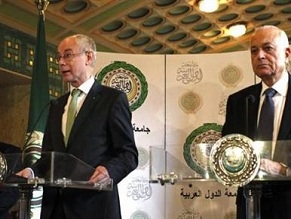|
World Jewish News

EU Council presidnet Herman Van Romouy and Arab League Secretary-General Nabil Elaraby
|
EU’s Van Rompuy calls for ‘concerted and coordinated actions by all key actors’ on Middle East peace process in meeting with Ara
16.01.2013, Israel and the World EU Council President Herman Van Rompuy met with Arab League Secretary-General Nabil Elaraby Monday as part of his Egypt trip as he sought to increase the organisation’s “dialogue and cooperation” with the EU in order to solve current Middle East crises, including the Israeli-Palestinian conflict and the Syrian civil war.
In a statement following the meeting of the two leaders, Van Rompuy summarised they had agreed that “now is the time to look forward and to take bold steps towards peace in the Middle East”, as he spoke of the immediate need for “direct and substantial negotiations, without preconditions, among the parties in the Palestinian-Israeli conflict”.
“The aim should be a lasting solution ending all claims,” he concluded.
Their discussions followed November’s second EU-Arab League meeting of foreign ministers, also held in Egypt, which saw both parties adopt the Cairo Declaration in which they called for “the removal of all obstacles that prevent an immediate resumption of negotiations” between Israel and the Palestinian Authority (PA).
The strongly-worded agreement re-emphasised international consensus that a two state solution offers the most viable opportunity for peace in the region, as ministers “reaffirmed their shared position not to recognise any changes to the pre-1967 borders other than those agreed by both parties including with regard to Jerusalem”. This was the start of a series of statements likely to rankle with the Israeli administration, which continues to refer to a united Jerusalem as the Jewish State’s “eternal capital”.
A “just comprehensive peace”, it added, “is a strategic objective and vital for the stability of the region and international peace and security”.
Other incendiary clauses included a broad condemnation of Israeli settlement policy, which EU and Arab League ministers concluded “are illegal under international law and constitute an obstacle to peace”.
The meeting which coincided with Gaza hostilities, which saw terrorist rulers Hamas launch a barrage of attacks on Israeli territory was only mentioned fleetingly, as ministers instead paid tribute to Egypt’s ultimately successfully efforts to broker a ceasefire between the two sides.
The declaration also included a joint commitment for : “the European Parliament and the Arab Parliament to strengthen communication between them in order to realise the ambition of peoples of the two regions to establish the principles of freedom, justice and human rights, as well as to promote mutual respect and tolerance between people belonging to different cultural, religious and ethnic groups”.
Monday’s meeting also featured discussions on the ongoing Syrian crisis, which both Van Rompuy and Elaraby concluded is “appalling and unacceptable2, as recent UN figures revealed a death toll reaching 60,000. Calling on longtime authoritarian leader Bashar al Assad to “step aside”, as part of international efforts to support the internal inclusive democratic transition, they committed their faith in UN-Arab League envoy Lakhdar Brahimi to decipher “a political solution to the crisis”.
Their previous joint Cairo Declaration on Syria invested both sides’ faith in the formation of the Syrian opposition coalition as “a major step in forming a broad and representative opposition”. They also agreed that “all those responsible for human rights violations and abuses be held accountable”.
Monday also saw a Swiss-initiated appeal to the UN Security Council for it to refer the Syrian issue to the International Criminal Court to ensure those responsible for reported human rights violations did not escape with impunity, signed by 57 countries, including all EU member states with the exception of Sweden. However, despite the Arab League’s vocal solidarity with the EU’s stance on Syria and its previous statements that those responsible for human rights violations should be held accountable, only Tunisia and Libya co-signed the protest, with emerging international mediator Egypt refraining from joining in the appeal.
by: Shari Ryness
EJP
|
|
